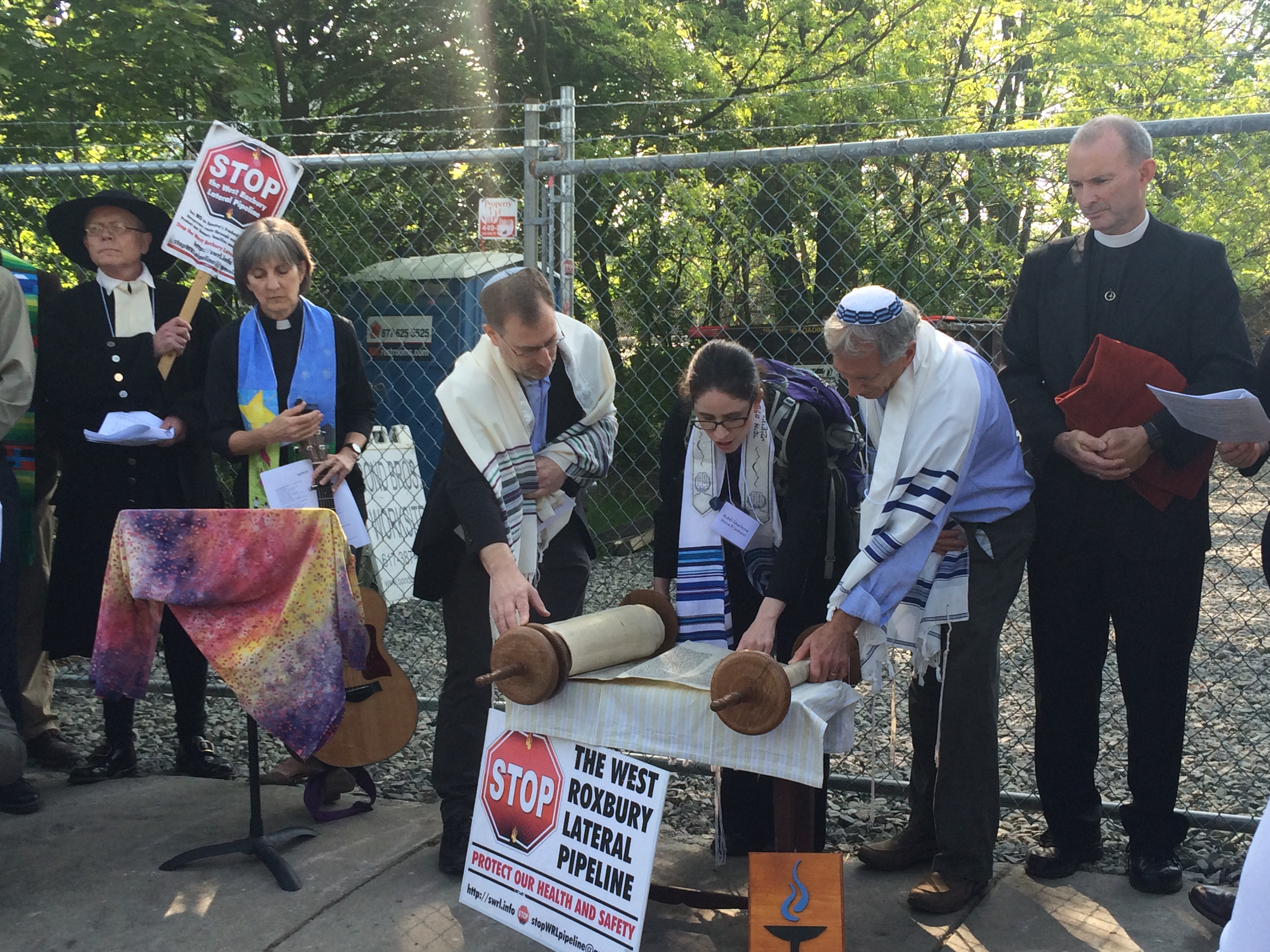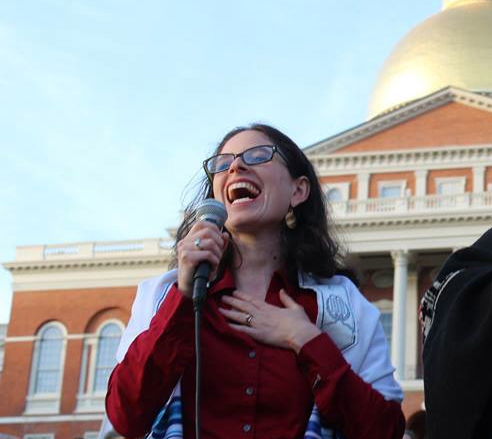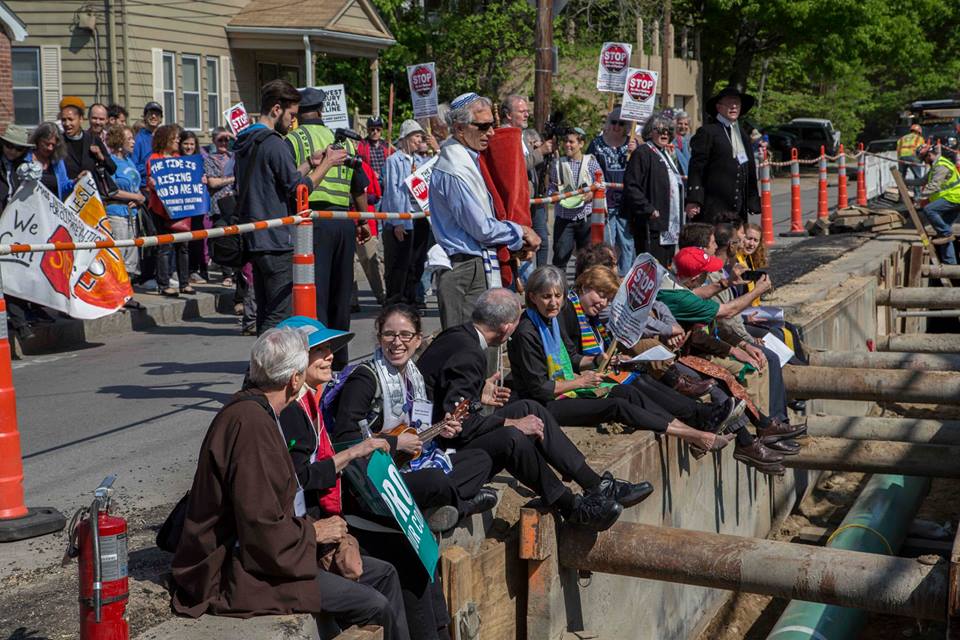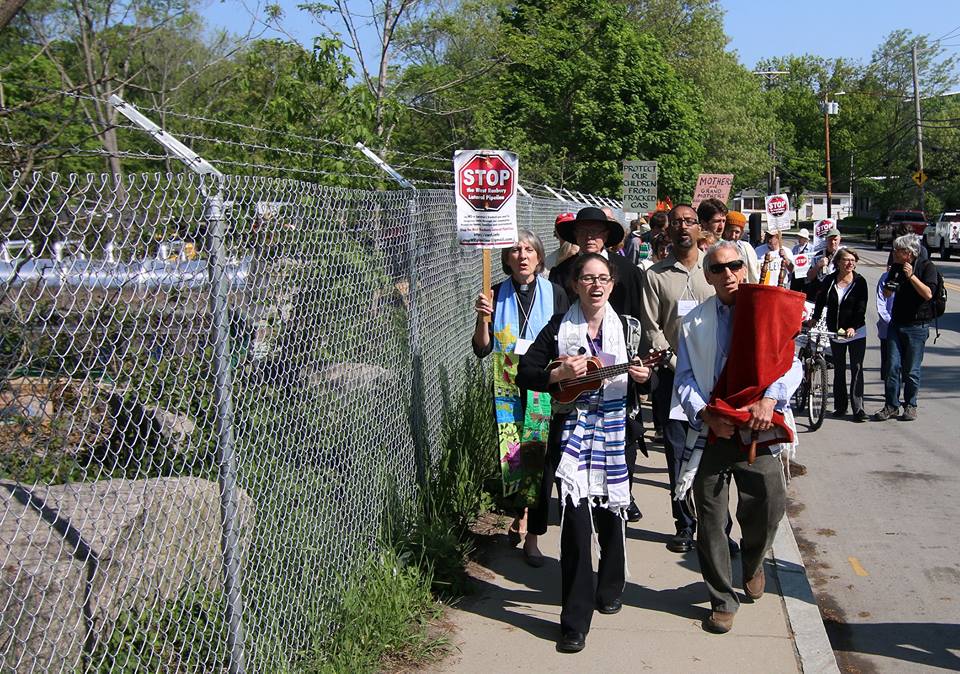We asked Rabbi Shoshana Friedman (Jewish Organizing Fellowship alum, Class of 2006) about her work organizing as a rabbi to fight climate change. Here’s what she had to share.

(Pictured: Rabbi Shoshana Friedman reading the Torah at a West Roxbury Lateral Pipeline action in May.)
Why is climate work important to you?
Climate change is an overarching moral crisis of our generation. What we do or don’t do is literally making or breaking the chance for ordered human civilization to continue on earth, and for millions of other species to survive or go extinct. Because the issue is so overwhelming, I felt paralyzed for years. By getting involved in the interfaith climate movement, I have found new language and theology for working toward climate justice. I work on climate because doing so is what I need to do to hold onto my own humanity. The work I’m doing is part of a giant global movement, so I don’t feel alone. I don’t know if we will succeed, but the struggle is deeply holy. The friends I have met and inner struggles I have surmounted in this work have spiritually transformed me, and opened my heart deeply. So I do climate work both because of the climate crisis, and because doings so is a path of growth and spiritual development for me.
 (Pictured: Rabbi Shoshana in front of the Massachusetts State House for a December climate action.)
(Pictured: Rabbi Shoshana in front of the Massachusetts State House for a December climate action.)
What projects have you been working on?
I have been involved in state level advocacy for a just and clean energy future in Massachusetts. I am on the leadership team of a group called the Mass Interfaith Coalition for Climate Action (MAICCA) that formed in October. Together with other climate groups, we have helped move the dial on state energy policy in Massachusetts, though as of this writing the final bill hasn’t come out of the legislature. While I want to keep my feet in legislative work, I have been increasing drawn to peaceful direct action. I need my own response to the crisis to be somewhere near the scale of the crisis, and non-violent civil disobedience is a way to do that. So far I have helped organize two direct actions against the West Roxbury Lateral pipeline. The first was a prayer service led by 16 clergy. We walked onto the construction site, stopped the construction by our presence, and sang and prayed until we were arrested.* The second was a symbolic mass grave funeral to call attention to the connection between the construction of fracked gas pipelines like the WRL and the bodies filling mass graves during deadly heatwaves. When my friends got into the trench and acted dead, we were rebranding the WRL pipeline trench a mass grave – not only because if it explodes it will level a neighborhood, but because the methane that leaks from fracked gas is a potent contributor to deadly climate change. **

(Pictured: Clergy participate in civil disobedience at the May 25th action against the West Roxbury Lateral Pipeline.)
Why do you believe that non-violent civil disobedience is a powerful strategy to fight climate change?
By putting my body in the way of the construction of a dangerous and climate destructive pipeline in West Roxbury, I am signaling to my community and the public the scale of this issue. I am making myself vulnerable in a way that actually gives me and the movement power to leverage change. As clergy we have a particular kind of power. We stand not just for ourselves, but for our traditions. We stand not just for our traditions, but for the spiritual and moral compass of humanity. This is why when clergy abuse their power it is such an outrage. When clergy use our power for good – peacefully but firmly and clearly making a moral statement, we get attention. We are calling for a just world, and we understand that the scale and speed of climate change are such that we cannot wait for policies. Twenty years ago we may have been able to just do policy work, but we failed. Now it is up to religious leaders and all concerned citizens to rise up against a system that is killing us, and to do so with the moral urgency of non-violent civil disobedience.
I started ClergyClimateAction.org to help others connect to this work. It is a website where you can take the pledge to do non violent civil disobedience for climate, find resources and other people in your area, and get support to plan your action. While it is directed specifically to clergy, lay people can also sign. I have been amazed and excited by the outpouring of interest.

(Pictured: Clergy march at the May 25th pipeline action.)
How has your training through JOIN’s Jewish Organizing Fellowship influenced the work you are doing?
I was blessed to go to a fabulous undergraduate school and a visionary rabbinical school, totaling ten years of higher education. But the one year I was at JOIN taught me more practical skills about working with groups, building relationships, active listening, strategizing campaigns, and making decisions than any training I ever had in school. Coupled with my practice of non-violent communication, the skills I learned at JOIN are a bedrock of my rabbinate and climate work. I use them literally every day.
You can check out ClergyClimateAction.org to take the pledge to do or support nonviolent civil disobedience for climate justice and connect with like minded people in your area.
For more information about the fight to stop the West Roxbury Lateral pipeline, visit ResistThePipeline.org.
For more on Rabbi Shoshana and her work, check out RabbiShoshana.com.
*You can read more about these actions in the Boston Globe and in the Huffington Post.
** You can read more about this action in the New York Times and NBC News.






